
COP25 Climate Change Conference: Every year the same…
thing. Expectations are, in the end, disappointed every year. UN climate summits are not normally cheerful occasions. But the disappointment this year is especially strong. COP in Madrid was meant to send out a strong message backing ambitious measures – a message reflecting the urgency and gravity of the coming disaster as well as the fact that the world is literally burning. There were meant to have been tougher targets, more money and concrete regulations.
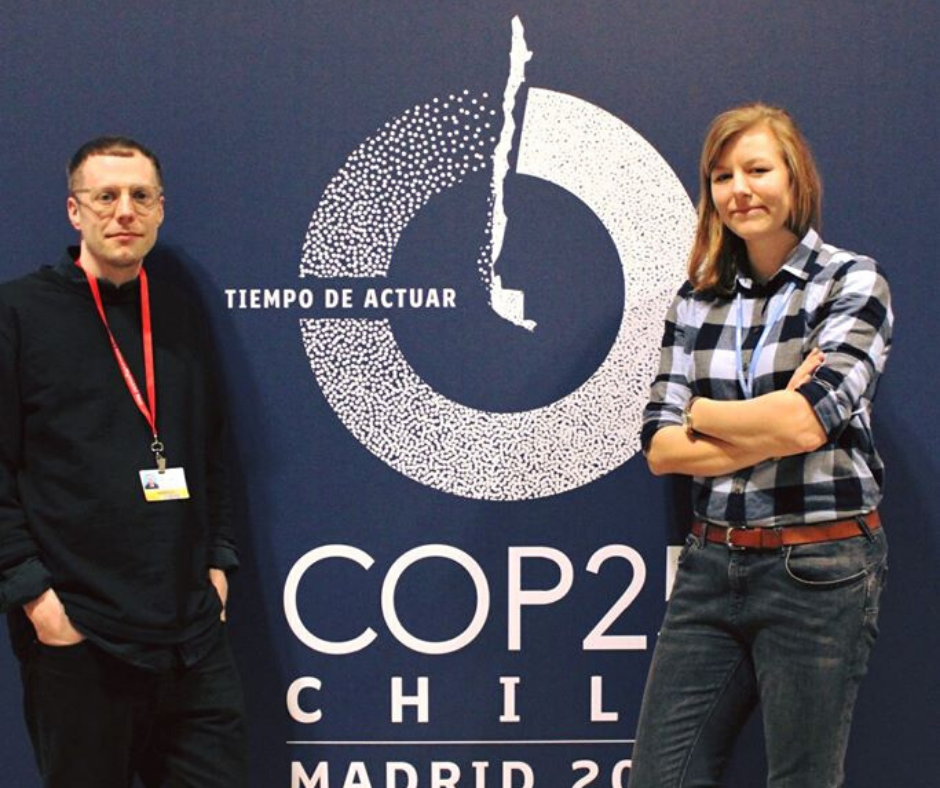 After very much exhaustive negotiation all that could be achieved was the softest possible slushy consensus. Even so, this managed to end talk of going back on even the Paris goals and the conclusion of the international community’s 25th climate conference was a “yes, you’re right, we need more ambitious goals and will set them next year”. NEXT YEAR!
After very much exhaustive negotiation all that could be achieved was the softest possible slushy consensus. Even so, this managed to end talk of going back on even the Paris goals and the conclusion of the international community’s 25th climate conference was a “yes, you’re right, we need more ambitious goals and will set them next year”. NEXT YEAR!
So much for the disappointment. Now for the hope. The COP25 resolutions at least show that most countries are firmly behind the Paris goals and ready for more ambitious proposals, and that environmental protection, human rights and human life all count for more than money; it was calling this into question that proved to be a deal-breaker. The stumbling-blocks and distractions put in the way of the negotiations by the fossil fuel-producing powers were shown to be the last vestiges of resistance – more ambitious goals must and will be discussed at the next COP.
Young people are making their voices heard
Here we summarise how our last two weeks have looked. They took us from hope to disappointment and back again — COP25 showed in any case that young people in the past year have become impossible to ignore. Where governments have persisted in obstinate thinking based around nation-states, NGOs have considered humanity as a whole and have more wind in their sails than ever before.
This COP we really wanted to bring young people all over Europe together. If EU members go into the negotiations with a united voice, youth organisations need to do so too. One of the first results of our effort was an open letter to the new EU Commission which demands much greater effort (quantified as NDCs in the Paris Agreement) from the EU when it comes to protecting the climate. We organised a small demonstration on the occasion of the Commissioners’ visit to Madrid to highlight our demands.
Blocked negotiations and a personality cult
Week one gave us two opportunities to pose questions and demands to the head of the German delegation, Ms Wilke. We demanded, as ever, more and better opportunities for youth participation, both in the negotiations themselves and at the national level. We fought for more ambitious targets and, as ever, highlighted the existing ways in which citizens can get involved in the political process as well as the other groups and organisations which need to be involved apart from youth ones. That was all well and good, but we demanded more. Young people are not just any old section of society – they are THE representatives of the future and thus need a seat at the table whenever the future is up for discussion. It would be strange, to say the least, to treat our common future as just another sectional interest.
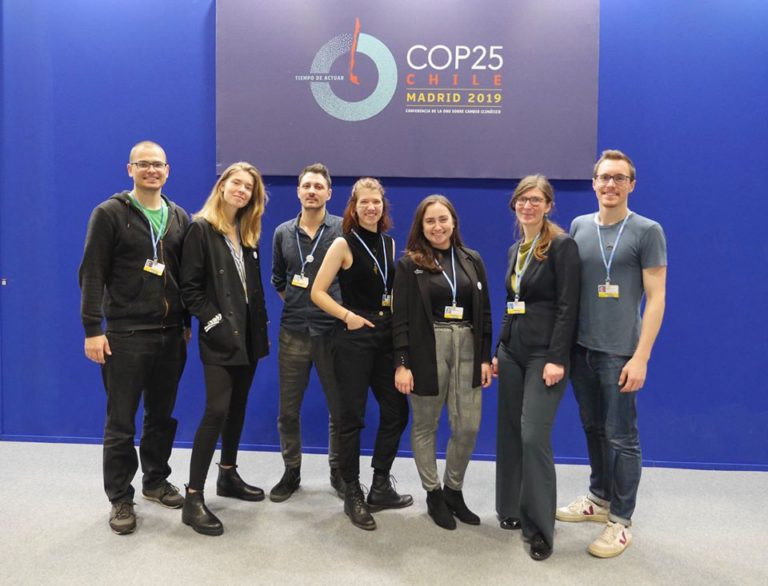 Media attention arrived at the latest by Friday, when Greta Thunberg arrived. But we need to be increasingly wary of what the media “report”. Dear Media, what’s more important? Substance and facts or a personality cult? A small sit-in in the conference hall on Friday morning was a small taste of what was to come – a 500,000 strong demonstration in Madrid in the evening. Such a spectacular number really makes an impression when you see everyone together on the street. Taking part in the march really motivated us to make the most of our privileged access to the negotiations.
Media attention arrived at the latest by Friday, when Greta Thunberg arrived. But we need to be increasingly wary of what the media “report”. Dear Media, what’s more important? Substance and facts or a personality cult? A small sit-in in the conference hall on Friday morning was a small taste of what was to come – a 500,000 strong demonstration in Madrid in the evening. Such a spectacular number really makes an impression when you see everyone together on the street. Taking part in the march really motivated us to make the most of our privileged access to the negotiations.
On Saturday we held our event in the German Pavilion, an event which had taken a long-time to prepare. We discussed the possibilities and limits of youth participation in the politics of climate change with Ingrid-Gabriela Hoven from the Ministry for Economic Cooperation and Development and Norbert Gorißen from the Ministry for the Environment, Nature Conservation and Nuclear Safety alongside young delegates from Sail to the COP, NAJU, Fridays for Future, COY15 and FIMCAP. We began with an animated discussion spurred by a livestream to Martinique, where our own Clara von Glasow was following negotiations along with Sail to the COP, and by a message from COY15, the youth climate conference which runs parallel to the COP.
The rules concerning market-based solutions (Article 6) which came out of the negotiations are particularly eye-catching, and not in a good way. It had proved impossible to agree on the detail here in previous rounds of negotiation in Bonn and Kattowitz. Positions only hardened at Madrid and the delaying tactics of certain negotiators more than strained everybody else. Hopes of movement on this issue rested on the ministers who joined negotiations in week two. A weak compromise on Article 6 would have endangered the whole point of setting targets in the Paris Agreement in the first place.
Costa Rica seemingly delivered the decisive blow to this attack on the integrity of the Paris Agreement with its “San José Principles”. They provide a robust regulatory framework for the market mechanisms set out in Article 6. Germany was the first G20 state to back them and by the end of the conference thirty other countries, including 17 EU-members, had too.
Climate Justice in Week Two
Our delegates met Svenja Schulze, a federal minister, Anne Spiegel, the Minister for Families, Women, Young People, Integration and Consumer Protection in Rheinland-Pfalz, as well as Anja Weißgärber from the Christian Social Union and the MEPs Delara Burkhardt and Mohamed Chahim. We also had frank discussions with Mr Sach from the German delegation and with members of the Bundestag’s Environment Committee. We made it clear that we stand not just for youth participation, but also for our knowledge, suggestions and ideas.
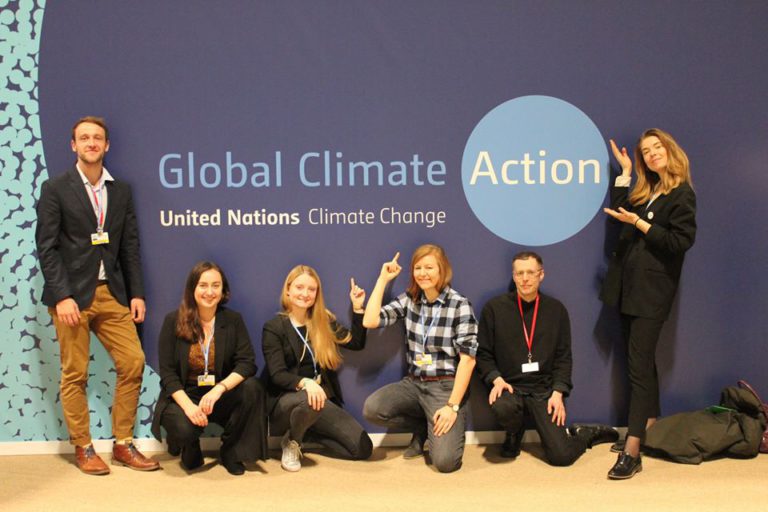 By week two it was impossible for conference-goers not to have been repeatedly reminded of climate justice. Hilda Nakabuye, a Fridays for Future activist in Uganda who also works to rid the country’s second-largest lake of plastic, spoke for young people in the Global South with her emotional speech that asked when the time for negotiation would stop and the time for action would begin. Her speech resulted in a standing ovation and teary eyes. Her message was clear. Whilst people are dying of climate change in countries all over the world every day, especially in the Global South, the Global North does not take anything like enough reponsibility for the crisis it has created. And they are running out of time to take responsibility. Her speech made the lack of clear resolutions on the point of “Loss and Damage” all the harder to take.
By week two it was impossible for conference-goers not to have been repeatedly reminded of climate justice. Hilda Nakabuye, a Fridays for Future activist in Uganda who also works to rid the country’s second-largest lake of plastic, spoke for young people in the Global South with her emotional speech that asked when the time for negotiation would stop and the time for action would begin. Her speech resulted in a standing ovation and teary eyes. Her message was clear. Whilst people are dying of climate change in countries all over the world every day, especially in the Global South, the Global North does not take anything like enough reponsibility for the crisis it has created. And they are running out of time to take responsibility. Her speech made the lack of clear resolutions on the point of “Loss and Damage” all the harder to take.
It was very hard to avoid the calls for climate justice on that day. Activists gathered on the stage and outside the negotiators’ rooms to demand an end to the delaying tactics as well as proper answers to the crisis which is already costing lives, especially those in the Global South. The press statements praising civil society organisations and youth movements belied the reality of their treatment. The conference organisers from the UNFCCC decided to forcibly end the protest and the resulting pictures will certainly leave a lasting impression of this COP.
We were invited to other events and roundtable discussions in the second week, touching upon the topics gender equality in the context of climate change as well as steady-state economics and the mobilisation of various groups in society for effective action on the climate.
Negotiations on article 6 were more or less stuck in the same place by the end of the COP as at the beginning. No one expected a quick and easy compromise by the time of the summit’s concluding talks and their end was, for this reason, repeatedly put back, from 16:00 to 18:00, 00:00 to 02:00 and all the way into Sunday morning.
Civil society organisations then proceeded to close the conference with a “People’s Closing Plenary” in which many speakers voiced their frustration over the negotiations which had, once again, proved fruitless. The Indigenous People’s Caucus summed it up well:
It is not ambitious to think seven generations ahead, it is the minimum.
It is not ambitious to respect the rights enumerated by the United Nations Declaration on the Rights of Indigenous Peoples (UNDRIP), it is the minimum.
It is not ambitious to meet NDCs, it is the minimum.
Upholding our rights is not ‘ambitious‘, it is the minimum.
But we do not want the minimum, we want to help you be ambitious.
Looking ahead to 2020
The hope remains that governments act upon the above.
All eyes are on the EU in 2020. A lot depends on whether it chooses to be an exemplar, setting ambitious targets in statute and implementing them, or not. The announcement of the Green New Deal was a good first step. Only if the EU sends out strong signals that it is serious will other big emitters like China, South Africa and India follow suit. A relevant law ought to be ready by the end of February and a draft of the new EU NDC ready by the summer. We look forward to it! In Germany, further action is currently being held up by our Minister for Economic Affairs.
From our point of view this means we have to start 2020 off with more projects and ideas. Giving up is not an option. That would mean giving up on the people today and in the future who are most affected by the climate crisis.
Note. The FRFG managed to reserve some places at the conference for young people from Klimadelegation e.V. You can thus find more information about COP25 on their website (German).
Climate action – Act now! (17 November 2017)
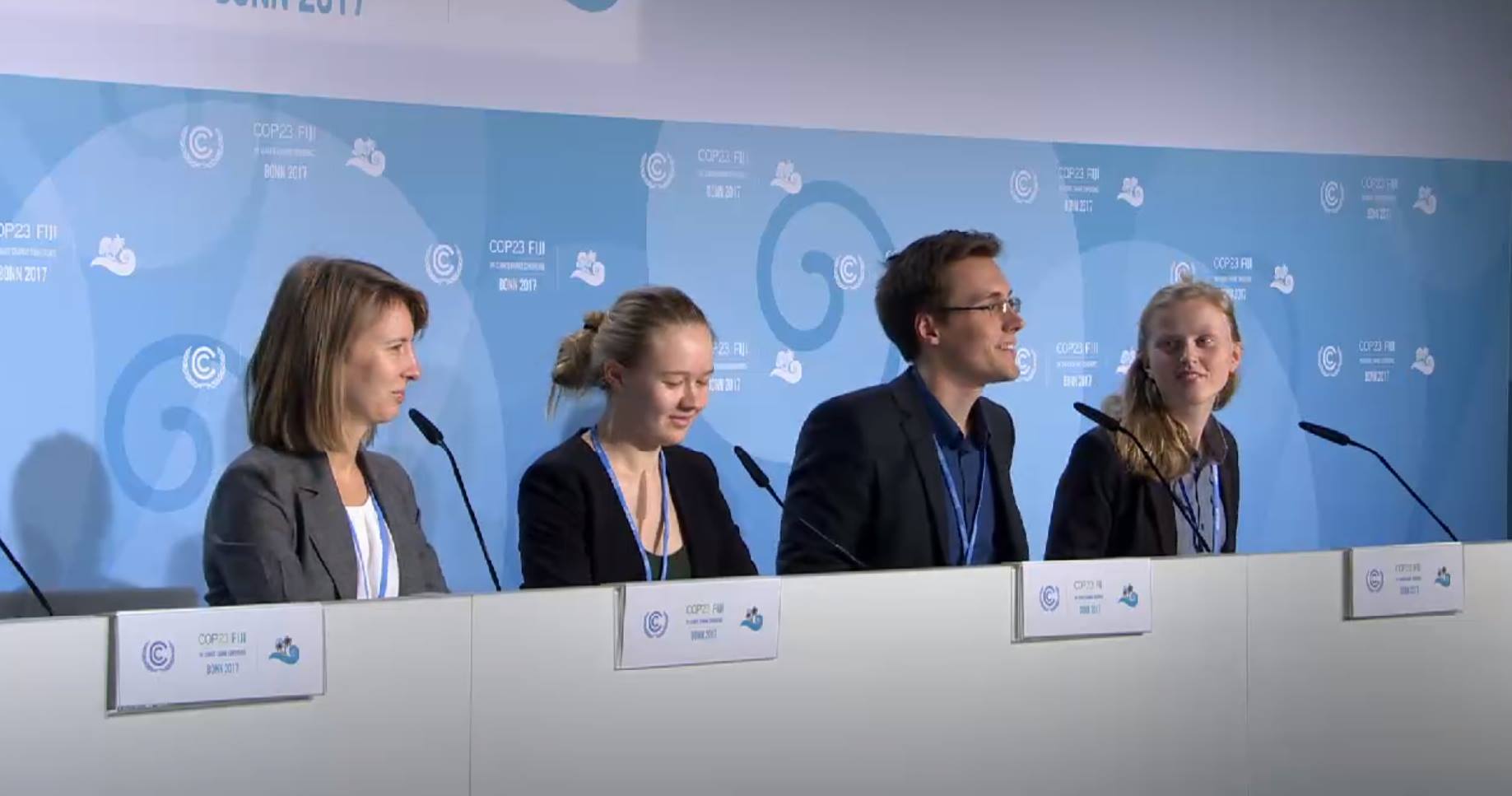 The FRFG gave a press conference, reporting on proceedings during COP23 in Bonn. Delegates of the FRFG and the Jugendbündnis Zukunftsenergie spoke about a recently organised young people’s exchange between Germany and Fiji, the necessity of keeping the climate in good shape and their open letter (in German) to the negotiators at the summit.
The FRFG gave a press conference, reporting on proceedings during COP23 in Bonn. Delegates of the FRFG and the Jugendbündnis Zukunftsenergie spoke about a recently organised young people’s exchange between Germany and Fiji, the necessity of keeping the climate in good shape and their open letter (in German) to the negotiators at the summit.
We made our demands clear with a protest as heads of state and government entered the conference building on the 16th. Though Germany has so far been considered a pioneer when it comes to climate change it now seems clear that we will miss our climate targets for 2020. We need an about-turn in transport policy and to abandon coal if we are going to meet our targets. Germany’s environmental policies are under the spotlight this year thanks to our hosting this UN summit. But we have been rather reserved up until now, especially when it comes to abandoning coal, which still accounts for 40% of total German energy production. 20 other countries, Canada and the United Kingdom among them, have meanwhile formed an anti-coal alliance. Germany has stayed out. At the same time politicians in Germany are passing up the opportunity of coalition negotiations to come up with new policies for the climate and swift measures to meet our targets.
Our open letter and demonstration at COP23 protested against that in particular. Germany must not be allowed to lose its credibility international climate negotiations.
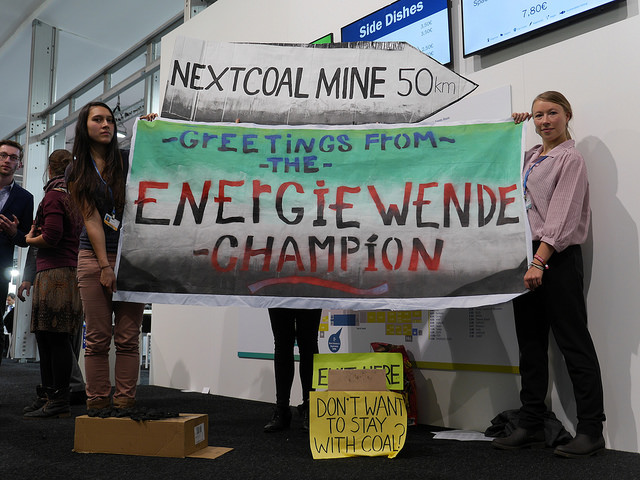
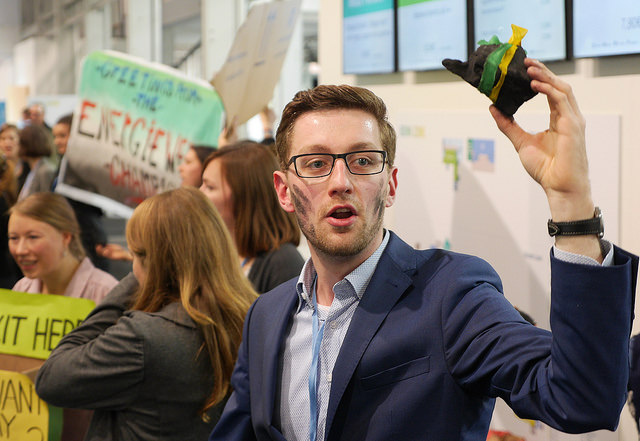
FRFG members at a UN conference on implementing the Paris Agreement (20 May 2017)
The May 2017 climate talks in Bonn involved preparatory talks for the main climate summit taking placing in November. Anna Braam, spokesperson for the FRFG’s board, and Anna Halbig, an FRFG ambassador, took part along with seven other young adults. The object of the talks was the implementation of the Paris Agreement — an important milestone in the history of efforts to combat climate change. The international community agreed for the first time to limit the average increase in the earth’s surface temperature to 2°c. But 2015 only decided the goal, the what. The point now was to agree upon how this goal can be achieved.
The Mood
Delegates had been affected by the US administration’s announcement that it was considering pulling out of the Paris Agreement. We were all under the impression that the final decision was going to be taken on the second day of negotiations, but then it was postponed until the end of May, after the G7 summit. There was a very light US presence at the negotiations. The Vietnamese delegation of 14, for example, was twice as large as that of the US. Trump’s announcement had an unexpected consequence, however. Countries were united in resolve and did not fall into uncertainty-induced resignation. A new alliance encompassing more than half of the world’s countries — EU members as well as developing nations in Africa, the Caribbean and the Pacific (the ACP states) – was announced on the last day of negotiations. The EU also promised €800 million in aid for ACP members affected by climate change. Trump’s announcement led to new levels of cooperation and determination, overcoming the previous division between between developed and developing countries.
An EU-Commissioner, Cañete, told the US that the Paris Agreement was “irreversible and non-negotiable”. While the US is continuing to (or more accurately, once again) supporting the coal industry, India and China are proving to be new pioneers, even exceeding their targets.
The Results
This round of negotiations in Bonn was very technical and mostly revolved around the question of adaption to climate change and lessening its effects. There was some progress, e.g. with working out the details of ‘Facilitative Dialogues’ that should examine whether countries’ self-imposed goals are compatible with the two-degree goal of the Paris Agreement and thus whether they need to be strengthened. Countries will only be able to actually see if their goals need to be more ambitious or not once the organisational details of these Facilitative Dialogues are set out. This is (still) expected to be forthcoming as are funds for paying for mitigation measures. The funds set out in the Kyoto Protocol for this purpose should also support the implementation of goals related to the Paris Agreement – that is the plan, at least. Many countries would not able to muster even relatively small sums of money for financing such projects without more concrete steps in this area. We are still waiting for firm commitments and regulations. The topic should be taken up again from the middle of October.
Contributions from FRFG delegates
Our work in Bonn focussed on “Action for Climate Empowerment”, or ACE. This involves education about and raising awareness of climate change. Article 6 of the 1992 UN Framework Convention on Climate Change first provided for these measures which made later appearances in the 2012 Doha Work Programme and Article 12 of the Paris Agreement. The UN refers to this for simplicity’s sake as ACE. It comprises six pillars: education, training, public awareness, public access to information, public participation and international cooperation. Each country develops national programmes for each of the six elements and one person in the delegation or environmental ministry of each country is expected to be an ACE contact person. FRFG delegates are working to develop a compendium of best practice, demands and suggestions for implementation along with the ACE working-group of YOUNGO, the body of UN youth representatives. Another of our concerns – apart from following the negotiations themselves – was organising the thirteenth Conference of Youth or COY (link in German) which will take place in Bonn from the 2nd to the 4th November 2017, shortly before the COP23 UN climate summit. 500 to 700 are expected to attend.
That poses a big logistical challenge. Rooms for workshops and conferences have to be found, accommodation, budgets and speakers have to be found in advance. The FRFG delegates Julius Schlumberger, Simon Lange and Luja von Köckritz introduced COY in a press conference at the negotiations.
More Information
You can find out more about Anna Braam’s and Anna Halbig’s work at the conference on the Klimadelegation blog (link in German).
UN Climate Conference in Lima: Update on Intergenerational Equity (18 December 2014)
In December 2014 Anna Halbig, FRFG ambassador, led three other delegates at the UN climate summit in Lima, Peru. The delegation fought for a proper and intergenerationally just climate agreement in talks with national delegations. They also took part in public-awareness intiatives at the conference site and held a press conference to this end.
The conference ended after fourteen days which had produced a weak compromise ducking the most difficult sticking points. In December 2015 Paris should play host to another summit which is expected to produce an agreement which is binding on all countries.


